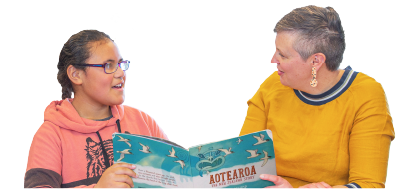Dreams and aspirations
Show video transcript
Title slide: Dreams and aspirations
Sala Alona, Teacher, Onepoto School, Auckland, facing camera
As a parent coming from the islands, we moved here to give our kids a better life, I suppose. I move here for a better life and now I want my kids to have what I don't have. So more opportunities for my kids, just go to school, study hard and just follow their dream. Whatever's there, don’t limit yourself to anything less because for me I don't have much. Shane and I, we don't have much to offer our kids, but we want our kids to have the best of what's in front of them. Try to focus and we will support it, all of our kids, whatever they decided to do.
Parents, teachers and children in classrooms
Kate Faavaivaiomanu Va’aelua, Parent, Christchurch, facing camera,
The aspirations that I have for my children are really culturally-based which is respecting your elders, being empathetic, sincere and just generally being kind to one another. And these are connected to my cultural values because we have grown up knowing that we respect our elders. We eat last. We let our parents eat first. We let them walk in the door first. Just little things like that and then that helps in their education. One thing I’ve always told my daughter is that you weren't born to follow, you were born to lead. And I try to plant that seed in her because I've grown up, I'm 30 now, and I still have these qualities where I'm leading my youth group within my own church. And I lead culture groups and now I'm also teaching my daughter’s culture group at her primary school. And I just want to plant that seed in my children, is to be leaders, don't follow.
Sunema Tepulolo, Student Prefect, Kelston Girls’ College, Auckland, facing camera
My dream is to study law. I only found interest in it because my sister took it, and then I started developing an interest for law. Basically, my parents, they value education a lot. So finishing high school first would really make them proud especially because they didn't get to graduate high school. They didn't get to go to university so I think that's why they value it so much and so seeing me maybe in the future if I do ever graduate from uni that would make them proud and that's my dream.
Rosaline Latuila, Student, Kelston Girls’ College, Auckland, facing camera
My dream is to become a doctor. Why I chose this dream is because growing up I've always seen like Pacific Islanders struggle with, especially my grandma. She struggled a lot through her health like diabetes and stuff and I've always wanted to help her and like I've always I've also always wanted to help people as well which makes me choose my dream of being a doctor.
Reverend Fitifiti Luatua, E.F.K.S Church, Christchurch, facing camera
One of the realities also that we need to know, as teachers, is these children are here to stay. They are going to form the future of our communities and our government.
Students of all ages, in different settings
So, we need to work with them well and to train them well because this would be the leaders of our communities in the future. So they need to also be supported to frame them and educate them well.
Reverend Fitifiti Luatua, E.F.K.S Church, Christchurch, facing camera
So it's a very important area of our holistic beings so to speak, you know, of being supportive and also consideration of other people because everyone is important. Everyone has a part to play within our lives.
This video shares the dreams and aspirations of Pacific parents, learners, and leaders. A recurring message through the video is the importance of getting a good education and seizing opportunities. Other aspirations include the development of culturally significant values such as respect, empathy and kindness. Leadership skills are also highly valued.
Reflections for individual teachers
As you watch this video think about your role as a teacher working within a Pacific context.
- What conversations have you had with your Pacific learners, parents, families and communities about their dreams and aspirations?
- How can you grow closer relationships with your Pacific learners and their families to learn more about what they want from their child’s learning environment? How can you make them feel empowered to share their perspectives and aspirations with you?
Reflections for staff or departments
The New Zealand Curriculum encourages schools to seek out and listen to the ideas of students, parents, families, whānau, and the wider community when designing their local curriculum (The New Zealand Curriculum, p37).
- How do you seek out and listen to the voices of your Pacific learners, their parents, families, and communities?
- How can you strengthen your relationships with your Pacific learners, and their parents and families, so that you can find out more about their dreams and aspirations?
- How can you use this information to design a local curriculum that is responsive to these dreams and aspirations?

